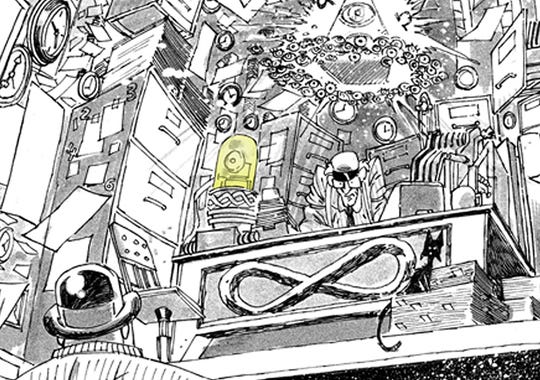| A recently deceased mathematician "cracks the recirculation algorithm" and thus is able to control his own reincarnation in the hope of being able to spend more time with the woman he loves. It ends up being a contest between Richard Thyme, the mathematician, and Zane, the thuggish "Karmic agent" who gets assigned to track him down and stop him from succeeding.
In this four issue comic book series from Titan (released in 2014 in the form of a graphic novel), the afterlife is not as it has been described to us by religion. Instead, pinstripe-suited thugs driving golf carts escort the dead under the command of a supreme being more interested in numbers than in ethics. He sits like an accountant at a desk bearing an infinity symbol. As Zane explains:
| (quoted from Numbercruncher)
[T]he eventual aim of the whole thing is...Well. Most folk'd call it "God" or "the rapture" or the bleedin' "singularity". The boss calls it: THE BIGGEST NUMBER THERE IS.
|
There are cute mathematical references throughout. Formulas float around the mathematician and the "divine calculator". We learn that the golf carts are propelled not by engines but by "Mandelbrot patterns and bloody eighth dimensional cosmohedrons". However, the main role of math in the story is simply the vague idea that the controller of the universe is interested only in math, and that this would give power to any mathematician clever enough to figure it out. In an interview with Brian Truitt of USA Today, the author explains: "Frankly, [the connection to math] started out as a requirement of the plot. I wanted our hero to be a normal Joe: someone without superpowers or big muscles or military training, a guy who uses his natural cleverness to literally break the rules of the Universe. Certain options presented themselves, but mostly they're the hackneyed nonsense you'd expect: cabalistic deals, sorcery, latter-day Faustian pacts. So I started thinking in more modern terms. Y'know who gleefully breaks the rules of reality everyday? Quantum theorists, existential physicists and mathematicians ... That in itself threw up a really lovely thematics slant on the whole story. If our central character manages to get one over on those who control the Laws of the Universe, using nothing but his intuitive mathematical brilliance, it follows that the Univerrse must be a kinda number-fixated place. And suddenly this whole wonderful world suggests itself."


| Contributed by
Alejandro Bustos
I felt mislead by this graphic novel, which advertises itself as the tale of a mathematician who controls his own reincarnation. I must confess that I was fascinated when I saw this summary. Unfortunately, when I read the comic, the story was a complete mess. While ostensibly a math-related work, this story really contains very little math, as much of the tale focuses on fighting, violence and a half-baked narrative. While the imagery is impressive, and the core idea is wonderful, the execution is chaotic (and not in a good way). I enjoy works that break the rules, and this comic had the potential to do just that. Sadly, the potential positives were undermined by a very flawed final product.
|
|




